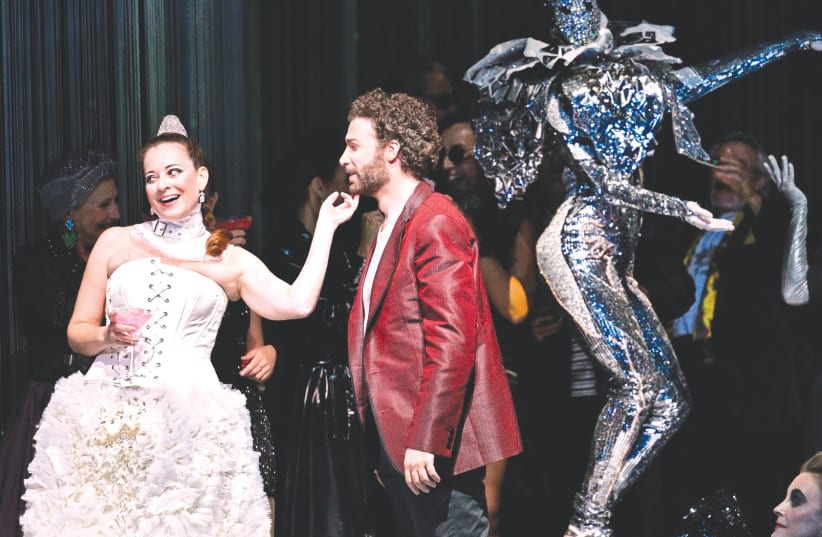The red carpet was rolled out for Verdi’s La Traviata, shown at the Israeli Opera in Tel Aviv, on Sunday. On their way to the performance, patrons were presented with an exhibition of costumes used in previous productions. The mannequins displayed a range of outfits, from Fromental Halévy’s La Juive to Gil Shohat’s Alpha and Omega.
Fashion, style, and glamor shape this production almost as much as Verdi’s music. Supported by fashion firm Factory 54, the performance depicted women in opulent costumes, who serve as living statues and male dancers in lavish matador corsets. When Flora (Anat Czarny) gathered guests for a fine revelry, the colorful outfit she wore was studded with white skeleton bones, reminding us death is always near.
The body is the fleshy garment of the soul. In this version of La Traviata, we are encouraged to see Violetta (Hila Baggio) as a person shattered by an impossible split between worlds. A beautiful courtesan, secretly weary of this teeming desert called Paris, she meets Alfredo (Oreste Cosimo). He gifts her with a promise of “Di quell’amor, quell’amor ch’è palpito/ Dell’universo” (That love that’s the/ pulse of the universe).
Encouraged, she puts the past behind her and, for a brief spell, knows true happiness in the country. Alas, her true love’s father (Ionut Pascu), a jilted, powerful lover (Noah Briger) and a creeping illness block true happiness for the poor, lost woman. Will Alfredo be worthy of her love and devotion, or will she face one betrayal too many?
The show
An operatic adaptation to the 1848 novel La Dame aux Camélias by Alexandre Dumas fils, Verdi offers us a very sharp look into the Demimonde. The half-world powerful and wealthy men create with high-society courtesans. In this night-time world, the mighty and the good can pretend to be traveling gypsies (“Noi Siamo Zingarelle”) and men can make or lose a fortune in gambling. It is a world of appearances. Alfredo cannot live happily in the country if Violetta foots the bill as this hurts his honor. His father, Giorgio Germont, cannot accept a tarnished family reputation. That would destroy his daughter’s chances to marry. Baron Douphole (Briger) will not accept losing Violetta to Alfredo, and so it goes.
Director Alessandro Talevi reimagined La Traviata in a bold new way, nearly exhuming its corporality. His Violetta sings “Sempre libera” (Always Free) next to a teeming pile of beautiful dancers celebrating sensation. When her health worsens, powerful lightbulbs descend from the ceiling, as if offering a medical inspection. Whenever Violetta appears on stage, she is the only character to wear a single-color costume. Hers is the only heart able to totally commit to just one thing.
Talevi is generous with visual cues and on-stage humor. When Douphole entered the stage, with bling and tinted glasses, he was busy with his mobile phone – which marked him as a negative character. When Alfredo tells Violetta his father sent him a letter (scritto) he shows her his phone, indicating it was a text.
Can Alfredo really see Violetta? Talevi, perhaps, suggests he does not. When we encounter them in the country he is busy painting her image. Smitten by her beauty, his love quickly becomes rage when he thinks he was rejected in favor of Douphole. While singing of love, Alfredo too, needs Violetta by his side as a sort of emotional eye candy. If this reading is correct, he is not much better from Douphole. Only Annina (Tal Bergman), her confidant, stays by her side until the very end.
“This is bewitching,” I heard a woman gasp during the performance, she was right. True, the opera is visually stunning and the respective dancers are breathtaking as they switch roles from almost fetishized living statues on a pedestal to brave matadors, but Verdi’s music and the living voices of the performers are what captivated the hearts of those seated. Baggio, Cosimo and Pascu were rewarded with lengthy applause.
Conductor Dan Ettinger masterfully led the orchestra and the audiences’ ears, through the nearly three-hours long opera. At the end, he honored the great bass-baritone Vladimir Braun (Doctor Grenvil).
Noting Braun was “in the opera when I first started out,” Ettinger shared with the audience Braun acted in more than 80 roles and 100 productions in this country, since he made aliyah from the USSR. His first performance here was also in Verdi’s La Traviata as Germont (Alfredo’s father). The audience cheered and clapped as Braun was awarded with flowers for his decades of artistic excellence.
La Traviata will run until August 10. For more information, visit: www.israel-opera.co.il/eng or call 03-692-7777.
